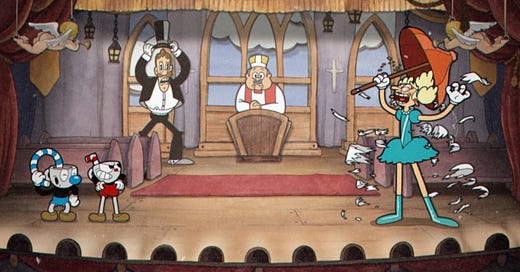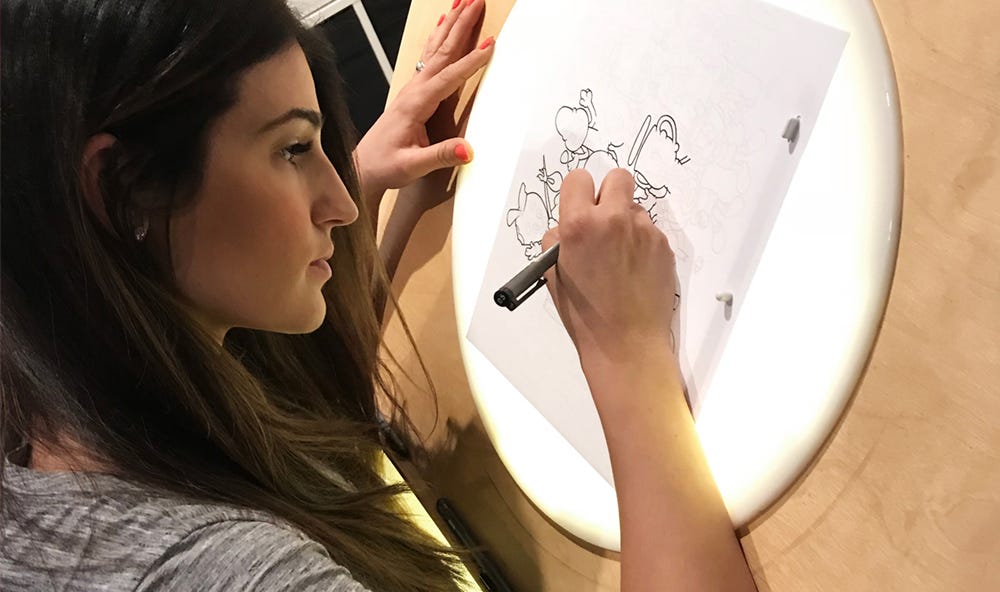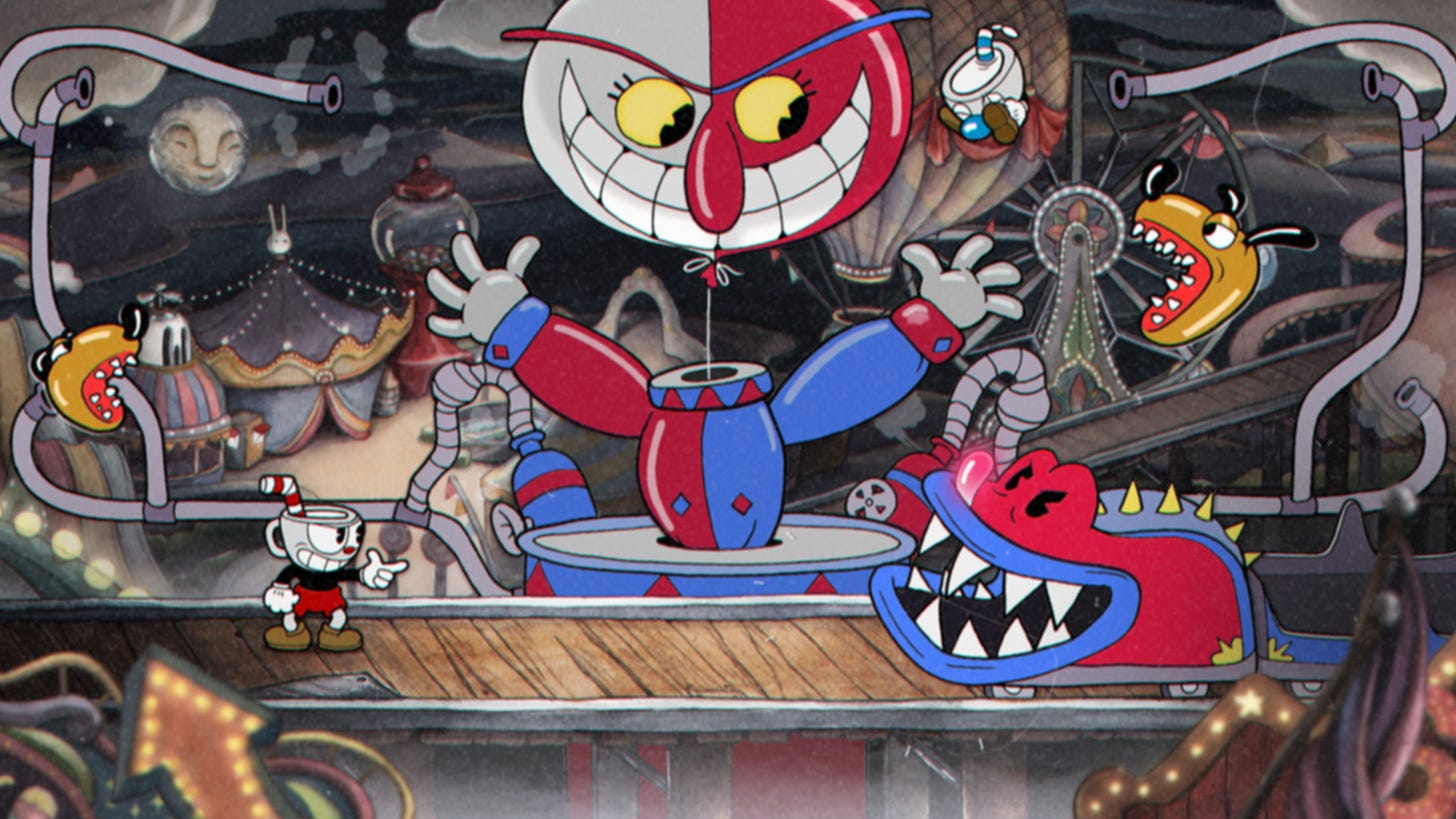Making the Acclaimed Cuphead Was a Lengthy Trial by Fire For a Brand-New Family
It was nonstop “controlled chaos” for two new parents who decided to pursue their dream of making a video game.
Maja Moldenhauer was in labor, anxiously awaiting an epidural to relieve some of the pain, when her husband, Chad, started yammering on about a major decision the couple had been contemplating: making a game. The two naively figured it would take a year to make the game they’d been dreaming up. But it would be many years, several more children, boldly deciding to leave their cozy day jobs, and a house remortgage before Cuphead arrived to commercial and critical acclaim in September 2017.
“I was telling Maja while she was like ‘Wahoo!’’ said Chad, noting the sometimes woozy feeling that follows an epidural injection.
“This is a great idea! [laughs]” said Maja, looking back with humorous hindsight.
But, like developers and parents, they didn’t know what they didn’t know.
The couple spoke to me last year, celebrating 10 years since forming Studio MDHR, and six years since the launch of Cuphead. The early days of what would become Cuphead coincided with the birth of their first child, and an uncertain future as parents and developers. Today, they have three children—ages spanning 9, 7, and 4—and have also turned their hope of being full-time developers into a reality.
The last decade has not been without its problems, with endless late nights balanced between the unyielding demands of game development and everyday parenting issues, like kids not sleeping and needing to keep them entertained and occupied. They largely did not have social lives while making Cuphead. Frequently, their families would call and offer and invite them to a gathering, knowing they would turn it down.
(Their families would, thankfully, save some leftovers.)
“I don't want to romanticize [this],” said Maja. “This was not a good way to live. I don't want to make it be like ‘this is what you gotta do,’ because you do not. It was just how things unfolded for us and transpired, and then we kept increasing the scope [of Cuphead] and reaching for the stars even more. But they were things that we knew and we accepted it. We're like, ‘okay, this is a sacrifice that we are choosing to make for ourselves, in hopes that this takes flight and we can do this for the rest of our lives.’”
Easy to say now.
In the earliest and smallest days, Studio MDHR was Maja as the developer’s inker and producer, Chad as co-director and animator, and Chad’s brother, Jared, as co-director. Jared was working construction when Studio MDHR was formed, and would sometimes finish a task, like pouring a basement wall, before heading over to help.
Maja spent a lot of time hunched over a desk drawing.
Cuphead would later become a Moldenhauer family affair, with others joining in.
Chad and Maja described the next few years of their life as “controlled chaos.” It’s an apt way to describe parenting, but especially so when undertaking an endeavor this ambitious. To them, the path seemed reasonable, given the rise of more accessible design tools like Unity, and the increased prominence of independent games on Xbox and PlayStation. You didn’t have to make a game that looked like Uncharted to succeed.
“I'm the youngest of four kids,” said Maja, “so I never really had babies around or anything like that. It was under the idea that we didn't want to be in our retirement years thinking coulda, shoulda woulda. ‘Damn, we didn't have the guts to go and do this.’ And so I really hung on to that—we're giving it a go. We're trying. The scope was very small at this time. There was no ‘Let's sell her house and quit our day job.’ Even though it eventually became that. [laughs]”
Talk to enough game developers and you’ll hear the same refrain: making a game takes longer than you think, and will always end up bigger than you anticipated.
“The scope was still incorrect for our guesstimates, but we were trying to finish a game in a year-ish,” said Chad. “That was what was in our mind.”
One year was very wrong. It took five years to complete Cuphead, start to finish.
“I don't want to romanticize [this]. This was not a good way to live. I don't want to make it be like ‘this is what you gotta do,’ because you do not. It was just how things unfolded for us and transpired, and then we kept increasing the scope [of Cuphead] and reaching for the stars.”
Cuphead’s design was influenced by the group’s appreciation of 80s games, rather than specific intention to make a game for kids. And yet, the reason Cuphead doesn’t have blood, gore, or profanity is because having kids gave them understandable pause.
Crucially, Chad and Maja didn’t have an alternative frame of reference for being parents. Having a child fundamentally shifts how you live your life and structure your relationships. Their home became their office. All of this seemed and felt normal.
“You aren't going in with any preconceived notions of how you think it's going to turn out, you're just riding the adventure wave as it comes,” said Chad. “It's a ton of hard work and lots of late nights—baby and work—but you don't have anything to look at, like, ‘Oh, I remember when we were running a company without kids!’”
“Our first [child] specifically did not sleep well, would not take a bottle,” said Maja. “So [I was] up all night. I have no other choice but to be the one to feed this baby, [but] you [Chad] have to work tomorrow on this game. We have to make some headway. And the times when I'm awake, I'm at the art table. It sounds manic as I'm talking about it out loud. No one's really asked us about this phase of our life before.”
The couple had a new baby, but they didn’t exactly have the money to hire a full-time nanny. They were starting from scratch. They needed help during the daytime, and found a local girl who’d just graduated high school, looking for some extra money.
“We were cut from the same cloth, really trusted her,” said Maja.
She wasn’t asking for much, which was helpful, because they didn’t have much to offer. But even a few hours was helpful during those early days. They’d work between naps. They’d work when the baby went to sleep—for a few hours, anyway. Rinse, repeat. The two learned how to be smart with limited time. An hour means something different when you have many to spare. With children, it’s a premium.
“You're forced to do that with a child no matter what,” said Chad, “and at the same time, some of those lessons learned, even if it's subconsciously, you're applying them to your work efforts, as well. It went hand-in-hand in a beautiful way, even though it was controlled chaos.”
And then came the second child.
“There was no ‘Hey, game's not done, let's hold off on [more] kids just yet,’” said Maja. “I was like, ‘We know we want kids close together.’”
She went to the hospital, delivered their second kid, and went “right back to the desk.”
“I remember having him on my lap and drawing while feeding him,” said Maja, “taking calls with Microsoft or other people. He's just always there and everyone just knew when I was on a call, I would probably have [him] on my lap or my shoulder.”
It was a slightly different world by then, though. Cuphead was coming together, and the game had been on Microsoft’s E3 stage, immediately putting the game on everyone’s radar. (They became a regular at Xbox’s E3 shows.) Being on someone’s radar is not money, but it was enough to push the couple to remortgage the house.
A newborn is scary, because they’re so small and seemingly fragile, but they don’t do very much. They eat, sleep, poop. It’s an oversimplification—with truth. It’s far more complicated when they get older. They start talking, and making demands beyond eating, sleeping, and pooping. As if life really needs to be more complex. C’mon.
Eventually, they’ll want to go to the park, even though you’re against a deadline.
“Even in how crazy things got back then,” said Maja, “in that time, I would say the kids were still the priority, in terms of if they came to us being like, ‘Hey, can we just go to the park for a bit? We would drop work for 20, 30 minutes, carve it out and say, 'We'll make up for it later.’ And then the nights were very rough. [laughs]”
“On the other side of that is them growing up into this,” said Chad. “They just felt like ‘oh, this is what this is how parents go to work.’ When we're at work, they weren't knocking. 'Hey, you're at home. This is so fun. Oh my gosh, you're usually not home!' To them, they're like, 'Okay, we have to leave them alone. Of course, when they're super young they don't quite understand.’”
As if to illustrate that point, during the interview, one of their children walked in.
“You aren't going in with any preconceived notions of how you think it's going to turn out, you're just riding the adventure wave as it comes. It's a ton of hard work and lots of late nights—baby and work—but you don't have anything to look at, like, ‘oh, I remember when we were running a company without kids!’”
My oldest daughter is only vaguely aware of what I do. She knows that I play games, but one time I had to explain to her 1st grade teacher that my profession is not “gamer.” Recently, when I told her that I spend most of my time writing thousands of words, she responded with a disturbingly long stare. I know, kiddo.
Maja and Chad’s kids know their parents worked on Cuphead, but it’s not a big deal.
“When the [Cuphead] Netflix show came out,” said Maja, “we called our friends and family and we had this viewing party at the house. It was way less elaborate than that even sounded. I remember [them] being like, ‘Why are we here? Why is everyone coming?’”
But naturally, they do come into their parent’s workspace, and at times contribute ideas and provide feedback. Several of them want to be game creators when they’re older. The couple even consulted them with storyboards for the Netflix show early in the process. The two oldest, born while Cuphead was being made, are part of various easter eggs in the game, including a few voice overs and being painted in as candy.
Cuphead went onto become a huge success, and transformed their lives. Part of the goal after Cuphead was to normalize own lives, especially as their kids aged up.
“It's much more controlled,” said Maja. “Resources is the operative term here. There's more personnel in the company, and I'm not the only one inking the entire game and tens of thousands of cells. There are inking artists. So we are very, very lucky.”
“Me, my brother, and Maja would be okay, even today, if we had to put tons of hours in for some reason,” said Chad. “But the goal of our company is that everybody has a normal, healthy, balanced life.”
It’s not always easy, a natural consequence of blurring a hobby with a career. What you did for fun in your free-time becomes what you do during work…and free-time.
“If I told you,” said Chad, “‘Hey, we finished work at 5:30, and after work, I went and I'm working in the garden for the whole time, I had so much fun,’ you would say ‘Hey, that's brilliant." You have this external hobby. It's not a problem. The thing is that the video game development creativity blends into a hobby.”
“Those lines get blurred a little bit,” said Maja.
Studio MDHR hasn’t announced what it’s working on next, though they are hiring.
Have a story idea? Want to share a tip? Got a funny parenting story? Drop Patrick an email.
Also:
I still feel bad I haven’t played Cuphead’s DLC, after finally getting to Cuphead years later and completely falling for it. Cannot wait to see what they do next.
The story of the Moldenhauer family feels cautionary; I do not think most people who took this same leap of faith would be rewarded in the same way.
The blurring of work and passion is a real double-edged sword. At this point, I’ve done it for so long I’m not sure I can extract the two, for better and worse.








I really appreciate this piece, because up until now I don't think I'd considered who created this game and phenomenon. Thank you for sharing their story.
Enjoyed this interview, Patrick. As a big fan of the game and DLC, its interesting to hear how much work went into it. And like Maja said here, the way this interview was structured was probably much different than they were used to. Thanks.